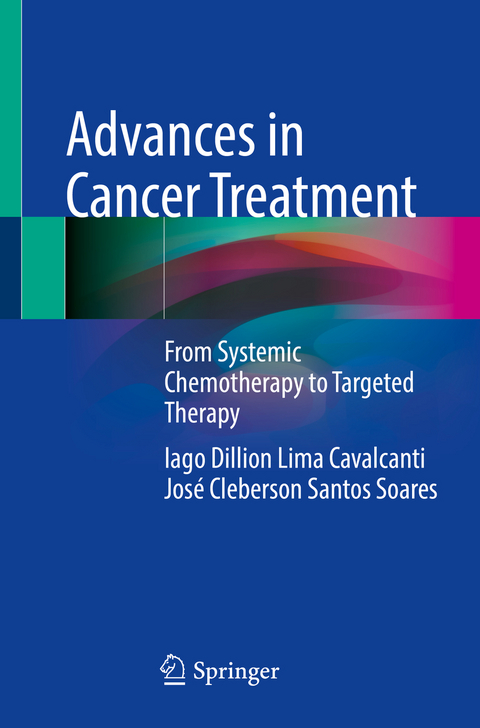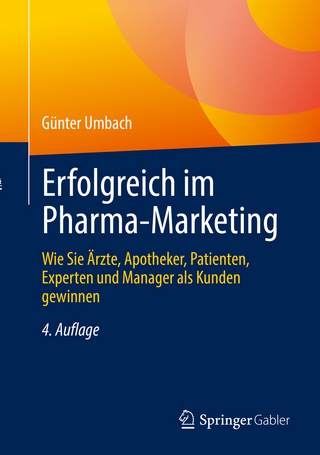
Advances in Cancer Treatment
Springer International Publishing (Verlag)
978-3-030-68333-7 (ISBN)
This work covers the pathophysiology of cancer, exploring the difficulty of optimal treatment due to the complexity and diversity of cancer types. The search for distinctive molecular biology characteristics of tumor cells is especially relevant in the identification of overexpressed receptors and proteins that can be used as a target for cancer treatment.
We highlight the main therapeutic modalities, particularly conventional systemic chemotherapy, addressing its mechanisms of action, therapeutic classes and even the toxic effects. We also describe the main tumor markers, their importance in the diagnosis and treatment of cancer, and the specificity of tumor cells.
The first chapters serve as an introduction to the central topic of this book, targeted therapy. Key aspects of target therapy, such as classes of drugs, immunotherapy, monoclonal antibodies, checkpoint inhibitors, cancer vaccines and tyrosine kinase inhibitors are presented, and, for each one, the benefits, as well as the adverse effects are reported. Chapter 6 compares conventional systemic chemotherapy and targeted therapy, identifies the risks and benefits and also the eligibility criteria for patient care. The possibility of targeted therapy replacing conventional chemotherapy is discussed while reviewing studies that demonstrate the benefits of combining both types of treatment. Finally, the introduction of pharmaceutical nanotechnology to improve antineoplastic agents is addressed in the last chapter and sets the direction for future research in cancer treatment.
This is a valuable resource for many health professionals including physicians, pharmacists, nurses, researchers and students interested in the field of oncology.
lt;p>Iago Dillion Lima Cavalcanti
Pharmacist, Specialist in Cancer Care and Palliative Care at the Centro Universitário Tabosa de Almeida. He obtained a Master's degree in Pharmaceutical Sciences from the Universidade Federal de Pernambuco.José Cleberson Santos Soares
Pharmacist, Specialist in Oncology Pharmacy at the Centro de Capacitação Educacional. He obtained a Master's degree in Pharmaceutical Sciences from the Universidade Federal de Pernambuco.Introduction.- Cancer: concepts and epidemiology.- A brief history of cancer.- What is Cancer?.- Cancer Epidemiology.- Cancer development and immunology.- Cell cycle.- Cell cycle control: the function of cyclins.- Cancer triggering agents.- Proto-oncogenes.- Tumor suppressor genes.- Development of tumor mass.- Cancer Immunology.- Discovery of tumor markers.- Cancer diagnosis.- Impact of the discovery of tumor markers.- Main tumor markers for cancer diagnosis.- Alpha-fetoprotein (AFP).- Human Chorionic Gonadotropin (beta-HCG).- Mucin-like cancer-associated antigen (MCA).- CA 15.3.- Carcinoembryonic antigen (CEA).- Bladder tumor antigen (BTA).- Telomerase.- Nuclear matrix protein (NMP 22).- Cyfra 21.1.- Prostatic acid phosphatase (PAP).- Prostate-specific antigen (PSA).- CA 125.- CA 19.9.- p53.- CA 72.4.- K-ras.- HER2.- Cancer staging.- Conventional cancer treatment.- Therapeutic modalities of cancer.- Surgery.- Radiotherapy.- Antineoplastic chemotherapy.- Classification of antineoplastic agents by cycle.- Specific cycle antineoplastics.- Nonspecific antineoplastic agents.- Classification of antineoplastic agents by chemical structure and function.- Alkylating agents.- Antimetabolites.- Plant-derived antineoplastics.- Antitumor antibiotics.- Chemotherapy toxicity.- Hematological toxicity.- Liver toxicity.- Cardiac toxicity.- Anthracyclines.- Fluoropyrimidine.- Taxanes.- Pulmonary toxicity.- Neurological toxicity.- Renal toxicity.- Gastrointestinal toxicity.- Metabolic changes.- Targeted therapies in cancer treatment.- Overexpressed receptors on tumor cells.- Immunotherapy.- Monoclonal antibodies.- Types of monoclonal antibodies.- Side effects of monoclonal antibodies.- Checkpoint Inhibitors.- Side effects of checkpoint inhibitors.- Cancer Vaccines.- Vaccines in cancer prevention.- Vaccines for the treatment of cancer.- Non-specific immunotherapies.- Tyrosine kinase inhibitors.- Imatinib.- Gefitinib.- Erlotinib.- Sorafenib.- Dasatinib.- Nilotinib.- Lapatinib.- Adverse events of tyrosine kinase inhibitors.- Conventional chemotherapy vs. targeted therapy.- Differences between conventional chemotherapy and targeted therapy.- Risks and benefits of conventional chemotherapy compared to targeted therapy.- Eligibility criteria for the indication of the targeted therapy.- Side effects of targeted therapy.- Can targeted therapy replace conventional chemotherapy?.- Targeted therapy associated with conventional chemotherapy.- Pharmaceutical nanotechnology applied to cancer.- Pharmaceutical nanotechnology.- Classification of nanosystems.- Liposomes.- Micelles.- Polymeric nanoparticles.- Solid lipid nanoparticles.- Magnetic nanoparticles.- Metal nanoparticles.- Main functions of nanosystems in cancer.- Pharmaceutical nanotechnology in cancer diagnosis.- Pharmaceutical nanotechnology for cancer treatment.
| Erscheinungsdatum | 01.03.2021 |
|---|---|
| Zusatzinfo | VIII, 109 p. 27 illus., 25 illus. in color. |
| Verlagsort | Cham |
| Sprache | englisch |
| Maße | 155 x 235 mm |
| Gewicht | 238 g |
| Themenwelt | Medizin / Pharmazie ► Medizinische Fachgebiete |
| Medizin / Pharmazie ► Pharmazie ► PTA / PKA | |
| Schlagworte | Cancer Chemotherapy • cancer vaccines • checkpoint inhibitors • Clinical oncology • immunotherapy • monoclonal antibodies • Pharmaceutical nanotechnology • targeted therapy • tyrosine kinase inhibitors |
| ISBN-10 | 3-030-68333-8 / 3030683338 |
| ISBN-13 | 978-3-030-68333-7 / 9783030683337 |
| Zustand | Neuware |
| Informationen gemäß Produktsicherheitsverordnung (GPSR) | |
| Haben Sie eine Frage zum Produkt? |
aus dem Bereich


